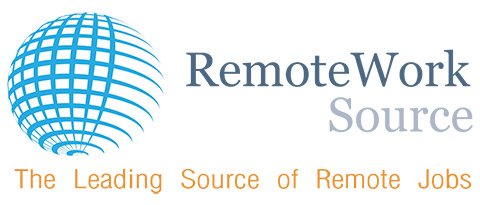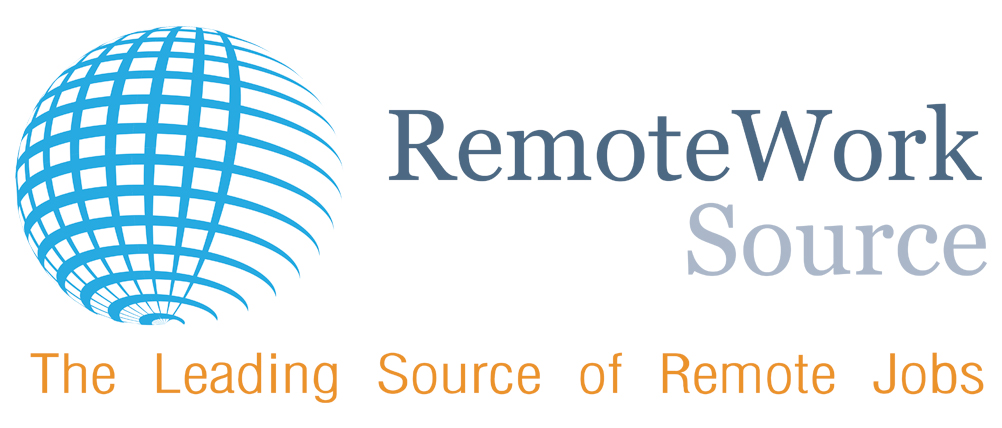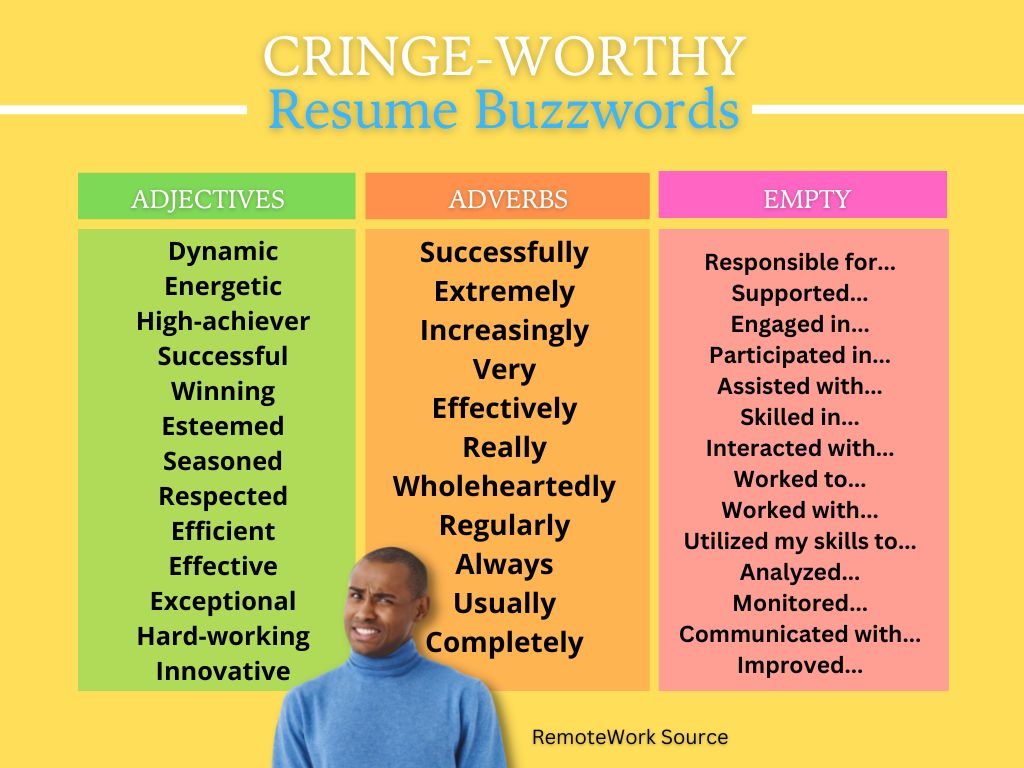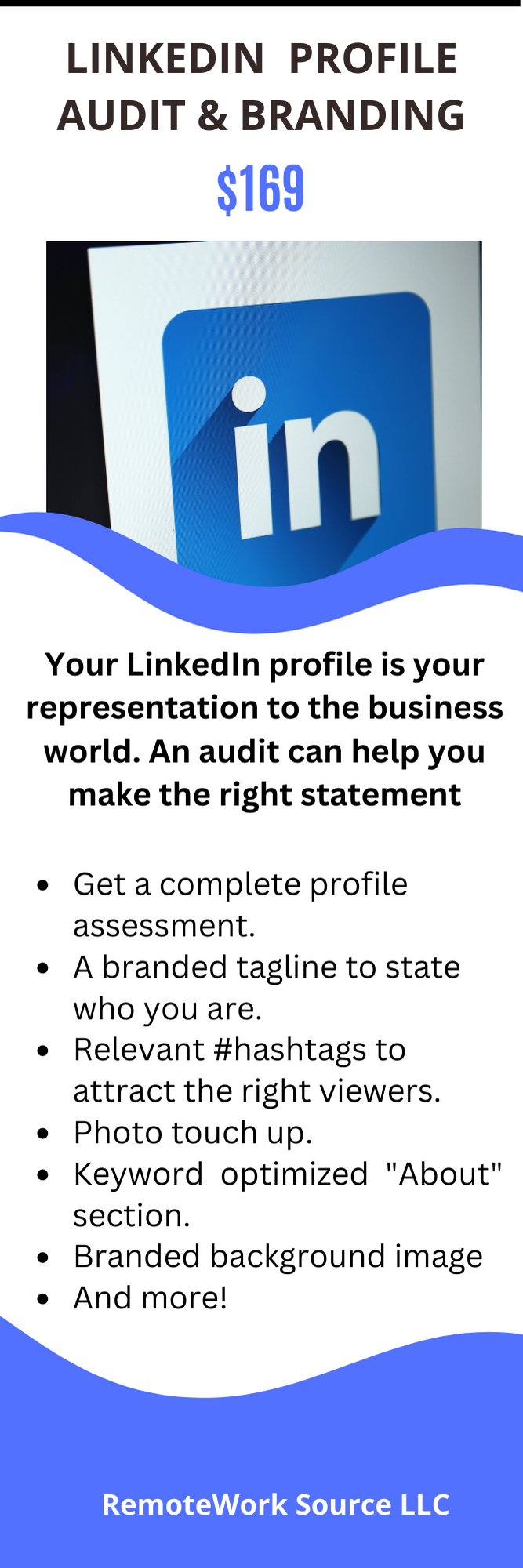Do Buzzwords and Cliches Make Your Resume Sound Less Powerful?
“Resume buzzwords have two major problems. First, everyone uses them, so they’re not going to help you stand out. More importantly? They’re vague, and don’t really tell hiring managers anything about your qualifications.” SmartRecruiters.com
In today’s job market, you have only a few options that will ensure you land an interview: being born into the “right” family (whatever that means); getting referred by someone; or writing a stellar resume that sells you as the best candidate for a job.
The latter is the only option in which we all have equal opportunity. No matter who we are, where we’ve been, and who we don’t know, each of us can write an interview-winning resume or CV.
True, not everyone can claim writing as their strong suit; they’re achievers in other areas. But that’s okay because resume writing is more about strategy than it is prose. It’s a bit of a science, one that uses a formula of sorts, and doesn’t take years to grasp. However, crafting a winning resume still requires time, concentration, and some research. Fortunately, these are things we all have at our disposal.
The internet is a wealth of information about resumes. Unlike other industry guidance, resume writing advice is consistent anywhere you look, eliminating possible confusion with the essentials. Therefore, we already know the basics of resume writing:
- Formatting—Chronological, Functional, and Hybrid
- Sections—Contact info, Summary, Experience, Education, et al.
- Appearance—Neat, use of white space, no longer than 1-2 pages
Another area that resume experts are consistent in is their advice about the word choices job seekers make to describe themselves and their work experience. However, this is where readers’ attention spans fade, and advice falls on deaf ears. (Or, eyes.)
Again and again, we see job seekers dilute their accomplishments and crush their value by using the exact buzzwords, and cliches and empty claims advised against, and so cringe-worthy to recruiters.
Why are these buzzwords and cliches problematic? For the job seeker, they weaken their resume. For the recruiter, they’re overused, empty, and subjective; raising more questions than they answer.
We’re going to look at some of these resume cliches. Then, we’ll dissect the use of buzzwords—adjectives and adverbs—that weaken a resume. As a bonus, I’ll give you a list of commonly used action verbs job seekers use to tell recruiters how useful they are/were, but in fact, say the complete opposite.
Cliches
Many of us use cliches in our everyday conversations without giving them much thought. We use them because they’re easier to say than coming up with tailored, clearer descriptions of ourselves and situations we want to convey.
However, your resume is not the place to lack clarity or use empty claims.
“We read and hear clichés and overused metaphors all the time, in books, movies and in our own daily speech. We use them because they help paint a more vivid picture for readers, movie-goers and listeners. However, clichés and overused metaphors in writing can dull the impact of a passage,” explains Gail Tagarro, in an article addressed to writers. [Emphasis added.]
A few resume cliches that have become meaningless include:
Think outside the box
Best of breed
Go-to-person
Results-driven
Quick to learn
Think on my feet
Proven ability
Give 110 percent
Hit the ground running
Goal-oriented
“When filling out resumes, many people put a memorable phrase, which sounds like ‘a proven ability.’ HR managers always doubt the accuracy of this term. Who was it proven by, and how? If it was established, then how does it differ from the ones that were not proven? If you want to verify the credibility of your skills, then provide necessary examples of your career achievements.” https://resumewritinglab.com/blog/phrases-to-avoid-in-resume/
There are very few of us who don’t use metaphors or cliches in our day-to-day communication. That’s why a resume requires concentration and very intentional wording. The resume is a formal document, not a casual communication tool that most of us are used to.
“Job candidates must avoid making empty claims on their resume. An empty claim is one that is written down, but has no information added to support the claim. For example, if a job candidate were to write that they are an inspirational leader, but give no examples of leadership roles or tasks in their professional lives, this becomes an empty claim. When they fail to explain how they are an inspirational leader, or show an example of it, they are making an empty claim on their resume. Again, this is taking up space and not adding any extra value to the resume.”
https://www.tempstaff.net/2015/04/10/words-you-need-to-leave-off-your-resume/
Weak Buzzwords
Some buzzwords are useful. Such as strong verbs we encourage job seekers to include in their resumes. Others are useless. That’s because they don’t say anything. Or, they water down a powerful statement. To show you what I mean, let’s go back to an English grammar topic: adjectives and adverbs.
- An adjective describes a noun (person, place, or thing).
- An adverb modifies something (a verb, an action, or another adjective).
Adjectives
Using—or misusing—adjectives most commonly occurs in a professional summary or profile. Here is an example:
“Enthusiastic teacher with 10+ years’ exceptional experience in early child education.”
The person using the adjectives enthusiastic and exceptional wants to point out positive attributes about themselves as a teacher. But what?
Both exceptional and enthusiastic are subjective. The candidate’s definitions of them might differ from someone else’s interpretation. Who determined they were enthusiastic and exceptional? Their boss? Their students? Themselves? How does said enthusiasm and being exceptional prove they are valuable as a teacher? (Which is all a recruiter cares about!)
Of course, the person wanted to say that they enjoyed teaching, and perhaps their love of teaching created an environment that helped students excel. Unfortunately, this is an assumption, because it is unproven.
Instead, that candidate could quantify their claim by writing:
“Early child education teacher with a 10+ year track record of students scoring above grade.”
This is something that is verifiable. And it spells out “valuable teacher!”
“‘Strong communication skills.’ ‘Attention to detail.’ ‘Passion and drive.’ There’s no doubt that these are desirable qualities in a prospective employee. But when every resume includes them, they lose their meaning. Instead, look for more meaningful phrases and information that speak to their unique qualifications and show why they’re the best person for the job.
“For instance, you might want to highlight the fact that you have great communication skills. But everyone puts ‘good communication skills’ on their resume. What can you do instead? Show, don’t tell. Each word choice on your resume is a chance to showcase your ‘good communication skills’.” https://www.smartrecruiters.com/blog/4-worst-resume-cliches/
Using adjectives in a resume to describe yourself is considered fluff, unless a metric substantiates them.
Common misused “fluff” adjectives are:
Dynamic
Energetic
High-achiever
Successful
Winning
Esteemed
Seasoned
Respected
Efficient
Effective
Exceptional
Hard-working
Innovative
Okay, this list could keep going. None of these self-descriptors are bad. They’re outstanding characteristics. But they’re red flags for recruiters when they see them without validation.
Adverbs
The same way adjectives get misused, using adverbs can become a waste of space, and often taken as a clue that nothing was accomplished. Even when used with a verb backed by metrics, an adverb weakens the impact of the verb. In fact, Merriam-Webster defines an adverb this way:
“Adverbs are words that usually modify—that is, they limit or restrict the meaning.”
Bobbee Corbell, a recruiter with Nike, suggests that job seekers “turn those Adverbs into specific language, like a list of examples of why you were effective.”
Amber Crow, with IveyExec, agrees. “You can usually cut a vague adverb by choosing a more specific verb or adding more details that point to specific KPIs. Hiring managers like to see measurable outcomes listed in your job history.”
Examples of adverbs seen in resumes that weaken verbs are:
Successfully
Extremely
Increasingly
Very
Effectively
Really
Wholeheartedly
Regularly
Always
Usually
Completely
Let’s look at an example.
“Successfully spearheaded the launch of our marketing program.” Does using the word successfully tell the reader how it was successful? No. Therefore, it becomes an empty claim.
Let’s add metrics.
“Successfully spearheaded the launch of our marketing program, increasing revenue by 25%.” This is much better, as the increase of revenue shows things were a success. But wouldn’t it be stronger if the adverb was removed and the verb began the sentence?
Let’s see.
“Spearheaded the launch of our marketing program, increasing revenue by 25%.” Boom! That’s more like it. This sentence took off running and landed strong. That’s what recruiters want to see.
“[R]emove the adverbs, and let the verb do its job,” writes resume expert Doug Perry. “In most instances, verbs don’t need that extra punch. They tend to function better as a lone wolf and create a more compact and concise sentence or statement.”
Bonus: Recruiters’ most cringe-worthy verbs:
I feel the need to include this last list of resume faux pas. I see these daily, and at first glance, they look acceptable. After all, they are standing on their own without an adverb to water them down. But as you’ll see, these words actually raise questions (doubt), rather than give the reader confidence in the candidate’s abilities.
Responsible for…
“Responsible for the launch of 5 marketing campaigns.” (Did you actually launch them? Were they flops? What happened?)
Supported…
“Supported clients who requested assistance.” (How, exactly, did you help them?)
Engaged in…
“Engaged with students during monthly university recruiting events.” (Did anything become of all this engagement?)
Participated in…
“Participated in multi-disciplinary patient staffing meetings.” (Did you say anything? Offer an idea? Or just nod your head?)
Assisted with…
“Assisted in troubleshooting issues and bringing them to resolution.” (How did you assist? Did you research the trouble, or just hold the flashlight?)
Skilled in…
“Skilled in Python, Photoshop, Figma, and other software.” (Okay. Nice to know, especially since you’re applying for a role as a social worker.)
Interacted with…
“Interacted with children who visited the center.” (Did you play catch? Read stories? Hand out Fish Snacks?)
Worked with…
“Worked with the sales team to help guide the direction of sales goals.” (I’m almost afraid to ask in which direction the team went.)
Worked to…
“Worked to provide relevant information to management and other stakeholders.” (This is the equivalent of saying “tried to.”)
Utilized My Skills …
“Utilized my skills in HTML and CSS.” (To what end? And, please, just say “used.”)
Analyzed…
“Analyzed data to see if improvements could be made in marketing plans.” (Let me guess, you couldn’t find any, and that’s why you aren’t telling us what you did.)
Monitored…
“Monitored kitchen staff and regularly checked their plating.” (Sounds busy. For them, not you.)
Communicated with…
“Communicated with clients to get a clear understanding of their needs.” (Once you understood, how did you meet those needs?)
Improved…
“Improved sales.” (Really? How?)
Federal resume writer and Certified Federal Career Coach, Janine Wiggins, who specializes in resumes for transferring military personnel, says these are mistakes she often sees with her clients. “The main thing that weakens a federal resume is not following the formatting directions.” And, she adds, “not using a variety of action verbs like stating ‘served as ‘ or ‘managed’ multiple times instead of using words like ‘championed, spearheaded, and oversaw’.”
Wrap up
I won’t claim writing a resume is easy. It can be downright painful at times. I could go into societal norms and psychological factors that have a play in why writing our own resume is so difficult; but I’ll offer this simple piece of advice: everyone has value, and the writing your resume is not the time to be humble and shy. It’s also not the time to take the easy way out by doctoring your resume with buzzwords and cliches that sabotage the main goal of your resume, which is to land an interview.
Make writing your resume an activity that you intentionally schedule time for, not one you try to squeeze in between dinner and your favorite television show. Make writing your resume a “me time” activity, knowing that you are investing in yourself, your family, and your future. Then relax, open your mind, and let all the real accomplishments you’ve made become clear. When you have clarity, buzzwords and cliches won’t even fit into your writing.
Your turn: In the comments below, tell us what buzzwords, cliches, or cringe-worthy verbs pop out from your resume? What can you replace them with?
Let’s talk more about it. Join us on Facebook and LinkedIn
Does your resume need help? Check out our resume rewrite packages!
Category: Featured, Job Search, Resumes









